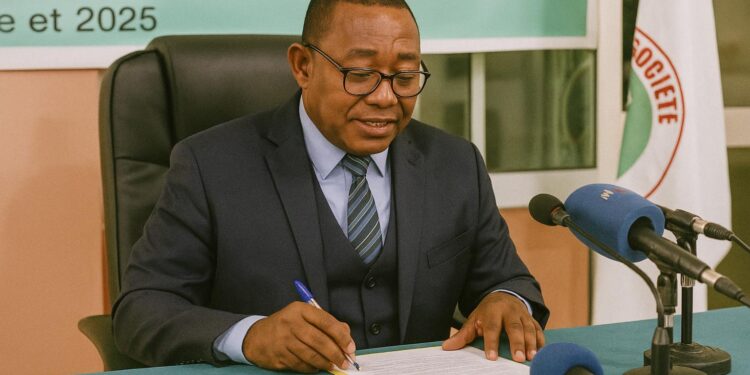Civil society sets the tempo
In the humid July air of Brazzaville’s Maison de la Société Civile, six prominent networks gathered under the banner of the Coordination of Electoral Governance and Democracy (CORAGED). Their communiqué, released after forty-eight hours of deliberations, called for a national concertation before the March 2026 presidential contest. The demand, framed with deference to constitutional prerogatives, underscores a conviction that broad-based dialogue can shield the country from the electoral frictions that once scarred its political landscape.
Céphas Germain Ewangui, permanent secretary of the Consultative Council for Civil Society, gave the closing address. ‘Our nation has marched, step by deliberate step, from institutional establishment toward institutional consolidation,’ he remarked, evoking the incremental trajectory that began with the 1992 multiparty breakthrough. His language, at once careful and confident, echoed the sentiment that democratic routines are gradually embedding themselves in the Congolese polity.
Government signals continuity
In the official corridors, the call for consultation has met neither repudiation nor unqualified embrace; rather, it is viewed as a familiar mechanism in the nation’s procedural repertoire. Since 2002, the Presidency has habitually convened political forces ahead of national polls, a practice credited with helping the Republic respect electoral calendars even amid oil-price shocks and pandemic turbulence (Ministry of Communication, 2024). Senior advisers to President Denis Sassou Nguesso privately note that a fresh round of talks would be ‘consistent with precedent and compatible with the government’s timetable’.
Observers at the International Conference on the Great Lakes Region underscore that Brazzaville’s record of on-time elections, including the 2021 presidential and 2022 legislative ballots, distinguishes it within Central Africa, where postponements have often been the norm. While opposition parties may contest results ex post, the administrative punctuality itself has become a point of diplomatic credit for the Republic.
Security and media as pivotal guarantees
CORAGED’s statement places a premium on security of persons and property and on an unfettered press. These dimensions resonate with guidelines issued by the African Union Election Observation Mission for the 2021 vote, which highlighted policing proportionality and media pluralism as core determinants of credibility (AU Report, 2021). The Interior Ministry insists that lessons learned from prior cycles—including the early deployment of mixed police-gendarmerie units and the accreditation of community radio stations—will be refined for 2026.
Press freedom organisations note incremental advances since the 2019 promulgation of the new Press Code, which decriminalised certain media offences. However, they caution that rural broadcasters still face logistical hurdles. Officials counter that a joint programme with UNDP, funded in April 2024, is earmarking satellite links to widen coverage. The tenor of these exchanges suggests a consensus on the variables; the debate concerns only the speed of their optimisation.
Regional precedents inform expectations
Diplomats stationed in Brazzaville frequently draw comparisons with Gabon’s 2023 polls and the Democratic Republic of Congo’s 2024 exercise, where civic consultations mitigated political temperature in one case and were absent in the other. The Congolese authorities, keen to preserve their reputation as a stabilising actor in the Gulf of Guinea, are thus inclined to treat civil-society overtures as complementary rather than confrontational. A senior official in the Ministry of Foreign Affairs observed that ‘the cost of dialogue is invariably lower than the cost of crisis’, a formulation that has gained traction in regional policy circles.
International IDEA’s 2023 report on electoral resilience names Congo-Brazzaville among the states where institutionalised consultation ‘pre-empts post-electoral litigation’. The reference, while cautiously worded, offers external validation for domestic advocates of a pre-ballot forum.
International partners and technical readiness
Technical preparation for 2026 is already under way at the Independent National Electoral Commission, which in May finalised terms for acquiring biometric kits from a South African consortium. The World Bank’s Governance Global Practice has advised on procurement transparency, a reflection of the wider donor interest in process legitimacy rather than outcome engineering.
European Union envoys, who observed the 2022 legislative elections, have indicated willingness to deploy a smaller, specialised mission focused on results transmission technology. Their position aligns with the government’s stated intent to publish provisional tallies within seventy-two hours, shortening the suspense that can fuel speculation. CORAGED, while welcoming these measures, reiterates that technology is no substitute for consensus on the rules of the game.
Pathways toward a peaceful 2026 ballot
The months ahead will likely witness calibrated choreography: presidential decrees setting the consultation agenda, opposition parties negotiating thematic breadth, and civil-society actors mediating technical disagreements. None of the interlocutors appears eager to relitigate foundational issues such as term limits or constitutional architecture, topics definitively settled in the 2015 referendum. Instead, the spotlight rests on operational ethics—campaign finance ceilings, equitable airtime, and the geographical reach of polling stations.
For diplomats and investors, the salient metric will be risk attenuation. A consultative framework, endorsed both by government and by CORAGED, can narrow the bandwidth of uncertainty. In a region where electoral timetables often serve as inflection points for volatility, Congo-Brazzaville’s methodical approach offers a study in preventive diplomacy. Whether ‘low decibels’ will indeed characterise the 2026 ballot depends less on rhetorical flourishes than on the quiet, incremental agreements now being sketched across conference tables in Brazzaville.











































